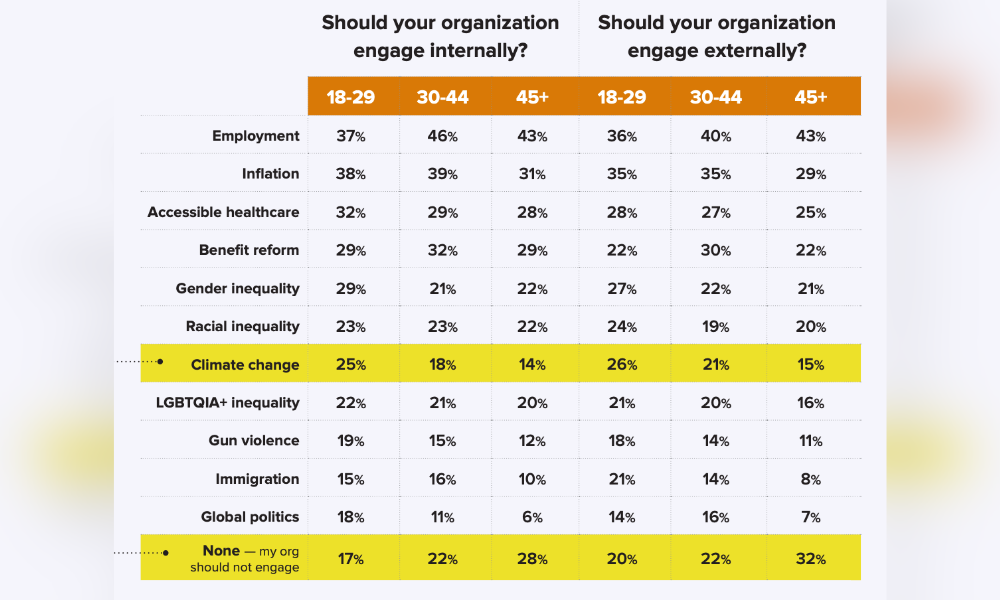
'When you have trust between leadership and teams, between your employees, you can actually have healthy debate'

For many employees, there is less inclination to talk about politics at work amid concerns that it will disrupt harmony in the workplace.
For example, HiBob's recent research found that 60% of employees are more hesitant in sharing their political views, and 77% would rather avoid political debates at work.
Why? Fears that such discussions could harm relationships with colleagues, or impact their chances at promotion, according to another report from E-Learning Industry.
But Jordan Zaslav, chief operating officer (COO) of Axios HQ, said accommodating a diverse set of political discourse at work boils down to trust.
"When you have trust between leadership and teams, when you have trust between your employees, you can actually have a lot of debate, and it can be healthy debate," he told HRD.
"When there's not trust and good intent, that's where things really fall apart. People start feeling personally attacked when someone disagrees with them because they don't know it comes from a good place."
Building that trust starts with communication, according to Zaslav.
"Communication is the bedrock," he said. "[It’s about] starting with those one-to-many communications and getting those right; having regular communication channels that you can go to that are built and trusted."
Being able to accommodate political discussions at work could benefit productivity, according to Zaslav. And HiBob's research found that younger employees tend to be advocates for free speech.
Axios HQ's 2024 State of Internal Communications also found that younger staff are more likely to want their leaders to address socio-political issues, such as climate change.
Zaslav said this is likely because the younger generation need to feel connected to their company's mission, as well as to feel seen and heard, to be productive in the workplace.
"And so, I think the reason that this political conversation is so important is not just because if you mishandle it, it can become a PR crisis that takes over the C-suite's week or month and damages the brand, but also because it really connects to productivity," he said.
"If your employees don't feel like they can be themselves at work and bring their whole selves to work, they're not going to be productive."
Beyond conflicting perspectives over whether political discourse should be raised at work, employers also face the problem of whether they should take a stand on ongoing socio-political matters affecting the world. HiBob's report found that a portion of employees don't want their CEOs to express opinions on politics publicly and want their organisations to stay neutral on socio-political matters.
But Axios HQ's 2024 State of Internal Communications report also found that a portion of employees, particularly younger staff, want their organisation to engage externally.

Source: Axios HQ's 2024 State of Internal Communications
Zaslav advised employers to be clear and consistent when taking a stand.
"If you project that ‘We're going to be talking about politics,’ ‘We're going to make a statement on everything,’ you're going to attract people who want to talk about it, who want a statement on everything, and that means you need to — because if you don't, now you've been inconsistent with your promise to your employees," he said.
Zaslav made an example of Coinbase, where CEO Brian Armstrong in 2020 banned polemics in the workplace.
"We are an intense culture and we are an apolitical culture," the CEO said. "We won't debate causes or political candidates internally that are unrelated to work."
Zaslav said a "significant amount of the company turned over as a result."
"What was left was an extreme example of very aligned company. People who worked at Coinbase knew exactly what they were going to get when they worked at Coinbase," he said. "They knew they were going to get a place where they weren't going to talk about the news, they weren't going to talk about politics, they were only going to talk about work."
He underscored that it's crucial to project to employees during hiring the company's values and culture, and to remain consistent with these values to avoid upsetting staff.
"Where employees get upset is not because you do or don't address something — it's because you are not consistent with the tone that you've sent with them.”
It’s all about knowing what you are and what your talent brand is, “and how can you just reinforce that in every decision you make," Zaslav said. "I think it honestly it makes it easier for employees, it makes it easier for employers and leaders."